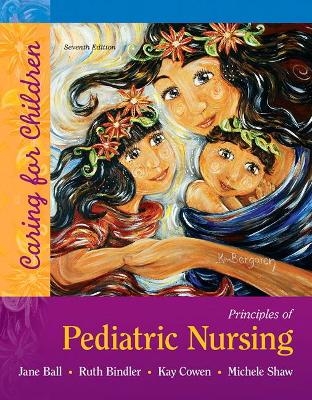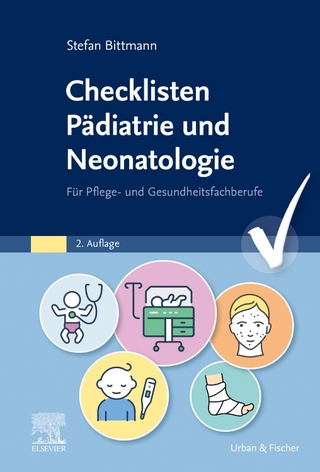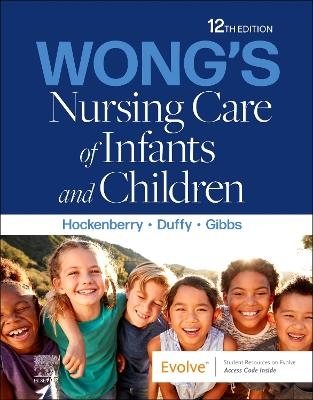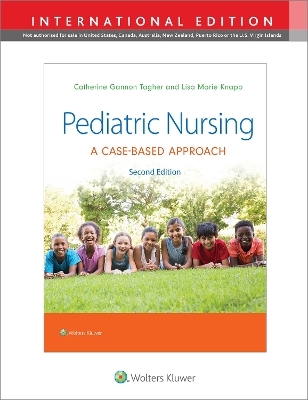
Principles of Pediatric Nursing
Pearson (Verlag)
978-0-13-425701-3 (ISBN)
Used books, rentals, and purchases made outside of Pearson
If purchasing or renting from companies other than Pearson, the access codes for Pearson's MyLab & Mastering products may not be included, may be incorrect, or may be previously redeemed. Check with the seller before completing your purchase.
For pediatric nursing courses in associate and baccalaureate degree programs.
Help readers learn to think like nurses and visualize how to care for children
To prepare today's students to begin thinking and acting like nurses, Principles of Pediatric Nursing, Seventh Edition presents a foundation of core pediatric nursing principles with an emphasis on growth and development, family-centered care, and health promotion and maintenance. Nursing students often bring an Adult Health mindset to Pediatric Nursing, which can obscure the special considerations needed to effectively care for children. Principles of Pediatric Nursing helps students visualize how to care for children and understand the ways caring for pediatric patients is similar to, and different from, adult patients.
Also available with MyNursingLab
MyNursingLab is an online self-study and class preparation program designed to engage students and improve results. Its personalized learning path helps students think like nurses as they move beyond memorization to true understanding through application.
Jane W. Ball graduated from the Johns Hopkins Hospital School of Nursing, and subsequently received a BS from the Johns Hopkins University. She began her nursing career working in the pediatric surgical inpatient, emergency department, and outpatient clinic of the Johns Hopkins Medical Center, first as a staff nurse and then as a pediatric nurse practitioner. After recognizing a need to focus on the health of children she returned to school and obtained both a master of public health and a doctor of public health degree from the Johns Hopkins University Bloomberg School of Public Health with a focus on maternal and child health. After graduation, Dr. Ball became the chief of child health services for the Commonwealth of Pennsylvania Department of Health. In this capacity she oversaw the state-funded well-child clinics and explored ways to improve education for the state’s community health nurses. After relocating to Texas, she joined the faculty at the University of Texas at Arlington School of Nursing to teach community pediatrics to registered nurses returning to school for a BSN. During this time she became involved in writing her first textbook, Mosby’s Guide to Physical Examination, which is currently in its eighth edition. After relocating to the Washington, DC, area, she worked at Children’s National Medical Center on a number of federally funded projects. The first project in 1986, teaching instructors of emergency medical technicians from all states about the special care children need during an emergency revealed the shortcomings of the emergency medical services system for children. This exposure was a career-changing event. A textbook entitled Pediatric Emergencies, A Manual for Prehospital Providers was subsequently developed. A second project led to the development of a pediatric emergency education program for nurses in emergency departments to promote improved care for children. Both of these programs served as a foundation for other pediatric emergency education developed and sponsored by national organizations. For 15 years, Dr. Ball managed the federally funded Emergency Medical Services for Children’s National Resource Center. As executive director, she provided and directed the provision of consultation and resource development for state health agencies, health professionals, families, and advocates about successful methods to improve the health care system so that children get optimal emergency care in all health care settings. After leaving that position, she continues to be engaged in many projects with a focus on the emergency care system. She is a consultant to the American College of Surgeons Committee on Trauma, supporting state trauma system development. She recently completed a federally funded project to study whether the implementation of a statewide pediatric emergency department recognition program improved pediatric emergency care. In 2010, Dr. Ball received the Distinguished Alumna Award from the Johns Hopkins University. Ruth C. McGillis Bindler received her BSN from Cornell University—New York Hospital School of Nursing. She worked in oncology nursing at Memorial-Sloan Kettering Cancer Center in New York, and then a public health nurse in Dane County, Wisconsin. Thus began her commitment to work with children as she visited children and their families at home, and served as a school nurse. Due to this interest in child health care needs, she earned her MS in child development from the University of Wisconsin. A move to Washington State was accompanied by a new job as a faculty member at the Intercollegiate Center for Nursing Education in Spokane. Dr. Bindler was fortunate to be involved for over 38 years in the growth of this nursing education consortium, which is a combination of public and private universities and colleges and is now the Washington State University (WSU) College of Nursing. Ruth obtained a PhD in human nutrition at WSU. She taught theory and clinical courses in child health nursing, cultural diversity and health, graduate research, pharmacology, and assessment, as well as serving as lead faculty for child health nursing. She was the first Director of the PhD in Nursing program at WSU and most recently served as Associate Dean for Graduate Programs, which include Master of Nursing, Post-Masters certificates, PhD and Doctor of Nursing Practice (DNP) programs. She recently retired and serves the college and profession as a professor emeritus, continuing work with graduate students and research. Her first professional book, Pediatric Medications, was published in 1981, and she has continued to publish articles and books in the areas of pediatric medications and pediatric health. Research foci have been childhood obesity, type 2 diabetes, metabolic syndrome, and cardiometabolic risk factors in children. Ethnic diversity and interprofessional collaboration have been additional themes in her work. Dr. Bindler believes that her role as a faculty member and administrator enabled her to learn continually, foster the development of students in nursing, lead and mentor junior faculty into the teaching role, and participate fully in the profession of nursing. In addition to teaching, research, publication, and leadership, she enhances her life by professional and community service, and by activities with her family. Kay J. Cowen received her BSN from East Carolina University in Greenville, North Carolina, and began her career as a staff nurse on the pediatric unit of North Carolina Baptist Hospital in Winston-Salem. She developed a special interest in the psychosocial needs of hospitalized children and preparing them for hospitalization. This led to the focus of her master’s thesis at the University of North Carolina at Greensboro (UNCG) where she received a master of science in nursing education degree with a focus in maternal child nursing. Mrs. Cowen began her teaching career in 1984 at UNCG where she continues today as clinical professor in the Parent Child Department. Her primary responsibilities include coordinating the pediatric nursing course, teaching classroom content, and supervising a clinical group of students. Mrs. Cowen shared her passion for the psychosocial care of children and the needs of their families through her first experience as an author in the chapter “Hospital Care for Children” in Jackson & Saunders’ Child Health Nursing: A Comprehensive Approach to the Care of Children and Their Families published in 1993. In the classroom, Mrs. Cowen realized that students learn through a variety of teaching strategies and became especially interested in the strategy of gaming. She led a research study to evaluate the effectiveness of gaming in the classroom and subsequently continues to incorporate gaming in her teaching. In the clinical setting, Mrs. Cowen teaches her students the skills needed to care for patients and the importance of family-centered care, focusing on not only the physical needs of the child but also the psychosocial needs of the child and family. During her teaching career, Mrs. Cowen has continued to work part time as a staff nurse: first on the pediatric unit of Moses Cone Hospital in Greensboro and then at Brenner Children’s Hospital in Winston-Salem. In 2006 she became the part-time pediatric nurse educator in Brenner’s Family Resource Center. Through this role she is able to extend her love of teaching to children and families. Through her role as an author, Mrs. Cowen is able to extend her dedication to pediatric nursing and nursing education. Michele R. Shaw received her BSN from Pacific Lutheran University in Tacoma, Washington. She began her career as a nurse at a long-term care facility and then as a home healthcare nurse in Spokane, Washington. While making home visits, she became interested in the nursing care needs of children and families. She realized the importance of educating the family about their child’s condition and to include family members while planning and carrying out the nursing care plan. This interest in family nursing led her into the area of maternal-child nursing, where she served as a postpartum nurse for nearly 18 years. Her experience with providing nursing care to families in various settings has highlighted her belief in the need of a family-centered approach in order to provide optimal nursing care. Dr. Shaw began her teaching career as a teaching assistant in 2001 at the Washington State University (WSU) College of Nursing, where she continues today as an associate professor. It was during those early years as a teaching assistant that she began to realize her passion for educating nursing students. This interest led to her completing a master’s degree in nursing with an emphasis on education at WSU. Knowing that she wanted to continue working in nursing academia, Dr. Shaw went on to receive her PhD in nursing from the University of Arizona in Tucson. She has taught theory, seminar, and clinical courses in maternal-child nursing, family health, evidence-based practice, ethical decision making, physical assessment, and professional practice. Dr. Shaw recently assisted in the development of the Bachelor of Science-to-PhD in Nursing program at WSU. This fast-track program will enable students with an earned bachelor’s degree to complete a PhD in nursing in four years. Dr. Shaw enjoys working with undergraduate and graduate students and encourages active participation in research. Her research interests include children with asthma and their families, childbearing women and their families, and substance use among youth and childbearing women. She is particularly interested in children’s and families’ unique perspectives, and thus much of her research uses qualitative approaches. She continues to publish articles in the areas of pediatric asthma and substance use among childbearing women. Dr. Shaw believes her active role in nursing academia and research allows her to stay current in various pedagogical approaches to enhance nursing students’ learning experiences, as well as continuous learning about evidence-based interventions to provide nursing care to children and families.
Nurse's Role in Care of the Child: Hospital, Community, and Home
Family-Centered Care and Cultural Considerations
Genetic and Genomic Influences
Growth and Development
Pediatric Assessment
Introduction to Health Promotion and Maintenance
Health Promotion and Maintenance for the Newborn and Infant
Health Promotion and Maintenance for the Toddler and Preschooler
Health Promotion and Maintenance for the School-Age Child and Adolescent
Nursing Considerations for the Child in the Community
Nursing Considerations for the Hospitalized Child
The Child with a Chronic Condition
The Child with a Life-Threatening Condition and End-of-Life Care
Infant, Child, and Adolescent Nutrition
Pain Assessment and Management in Children
Immunizations and Communicable Diseases
Social and Environmental Influences on the Child
Alterations in Fluid, Electrolyte, and Acid–Base Balance
Alterations in Eye, Ear, Nose, and Throat Function
Alterations in Respiratory Function
Alterations in Cardiovascular Function
Alterations in Immune Function
Alterations in Hematologic Function
The Child with Cancer
Alterations in Gastrointestinal Function
Alterations in Genitourinary Function
Alterations in Neurologic Function
Alterations in Mental Health and Cognition
Alterations in Musculoskeletal Function
Alterations in Endocrine and Metabolic Function
Alterations in Skin Integrity
Appendix A: Physical Growth Charts
Appendix B: Blood Pressure Tables
Appendix C: Dietary Reference Intakes
Appendix D: Selected Pediatric Laboratory Values
Appendix E: Diagnostic Tests and Procedures
Appendix F: Body Surface Nomogram
Appendix G: Conversions and Equations
| Erscheinungsdatum | 01.01.2017 |
|---|---|
| Sprache | englisch |
| Maße | 100 x 100 mm |
| Gewicht | 100 g |
| Themenwelt | Medizin / Pharmazie ► Pflege ► Kinderkrankenpflege |
| ISBN-10 | 0-13-425701-4 / 0134257014 |
| ISBN-13 | 978-0-13-425701-3 / 9780134257013 |
| Zustand | Neuware |
| Haben Sie eine Frage zum Produkt? |
aus dem Bereich


